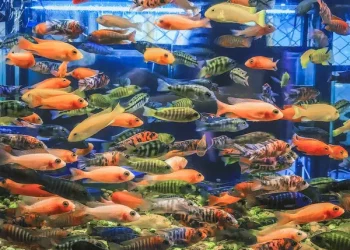Lungfish are a unique type of fish that are known for their ability to breathe air. They are able to survive out of water for extended periods of time, making them a fascinating species to study. In this article, we will explore how long a lungfish can live out of water and the factors that contribute to their survival.
- Lungfish and Their Unique Adaptations
Lungfish are found in various freshwater habitats around the world, and they have developed unique adaptations to allow them to survive in low-oxygen environments. One of their most notable adaptations is the ability to breathe air. Lungfish have a lung-like organ that allows them to extract oxygen from the air, and they can also extract oxygen from water through their gills.
Lungfish are also able to enter a state of dormancy called aestivation when conditions become unfavorable. During aestivation, lungfish can reduce their metabolic rate and survive without food or water for extended periods of time.
- How Long Can a Lungfish Live Out of Water?
Lungfish are able to survive out of water for several months, although the exact length of time varies depending on the species and environmental conditions. Some lungfish species can survive for up to four years without water, while others can only survive for a few months.
The African lungfish, which is found in parts of Africa, is one of the most well-known species of lungfish. African lungfish are able to survive out of water for up to four years by burying themselves in mud and secreting a slime layer to prevent moisture loss. During this time, they enter a state of dormancy and their metabolic rate decreases significantly.
- Factors That Contribute to Lungfish Survival
Several factors contribute to the ability of lungfish to survive out of water. One of the most important factors is the ability to extract oxygen from the air. The lung-like organ of the lungfish allows them to breathe air and extract oxygen, which is essential for survival.
Another important factor is the ability to enter a state of dormancy, which allows lungfish to conserve energy and survive without food or water for extended periods of time. During aestivation, lungfish can reduce their metabolic rate and enter a state of suspended animation until conditions become more favorable.
Finally, the ability to prevent moisture loss is also critical for lungfish survival. Some species of lungfish are able to secrete a slime layer that prevents moisture loss and protects them from drying out when out of water.
In conclusion, lungfish are a unique type of fish that are able to survive out of water for extended periods of time. They have developed a variety of adaptations that allow them to extract oxygen from the air, enter a state of dormancy, and prevent moisture loss. While the exact length of time that a lungfish can survive out of water varies depending on the species and environmental conditions, they are able to survive for several months or even years in the right conditions.

























